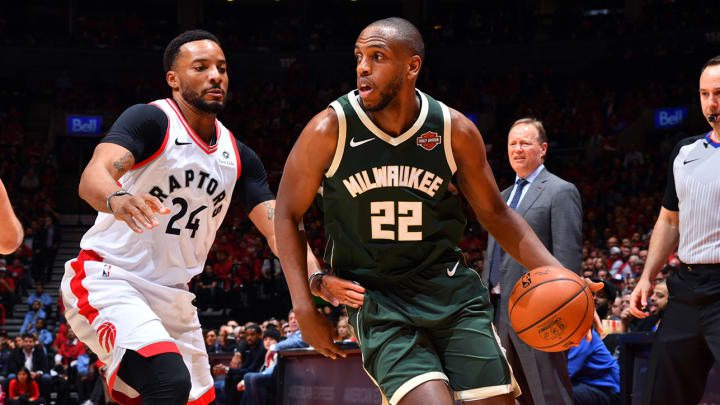Which NBA Free Agents Actually Stayed Put? Grading the Deals You Might Have Missed

Day 1 of 2019 NBA Free Agency was an absolute whirlwind. Over half of SI’s top 50 free agents locked in to their next deal, with teams handing out over $3 billion in contracts. With so many big names moving around and complicated sign-and-trades clogging Twitter timelines, it would have been easy to miss a great number of the deals going down Sunday. So now seems like a perfect time to grade some of those transactions, starting with the players who re-signed with their incumbent teams at the start of free agency.
Khris Middleton, Bucks: Five years, $178 million
Milwaukee basically had to bring back Middleton to keep the core of its East Finals team together. Middleton may not scream max player, but with so much of the league flush with cap space headed into free agency—and sign-and-trades suddenly becoming hot again—the Bucks couldn’t risk Middleton hitting the open market. This is the cost of doing business as a contender, and Milwaukee should be helped by the fact that the league is arguably little less top heavy compared to last season. At the very least, the Middleton contract is a message to Giannis that the Bucks want to keep All-Stars around him, though it’s disappointing that a fair contract for Middleton contributed to losing Malcolm Brogdon. Grade: B+
Tobias Harris, 76ers: Five years, $180 million
My colleague Jeremy Woo graded this deal yesterday, but I have some more thoughts. Offering Harris a full, five-year max—and not Jimmy Butler—is the kind of decision Elton Brand will ultimately be judged on. All of Philly’s moves have to be viewed in context of each other. Bringing back Harris and letting Butler walk meant picking up Al Horford and (most likely) Josh Richardson. Is this the best path for the Sixers moving forward? Will Harris work long-term at small forward? It’s very hard to say right now. Harris is basically locked in with Horford, Joel Embiid, and Ben Simmons moving forward...which seems slightly worse than with Butler in place of Horford. Philly’s roster juggling creates some fit concerns for Harris moving forward, and Brand may have felt pressured to pay for Harris after giving up so much to acquire him. With Harris likely being the third or fourth option in Philly for the majority of this contract, he could prove to be a little bit too expensive at this number. Grade: C+
Nikola Vucevic, Magic: Four years, $100 million
I’m sorry, but what’s the point of this? The Magic just have an absurd number of big men on the roster right now. How do they find playing time for all of Vooch, Mo Bamba, Jonathan Isaac, Aaron Gordon, and the newly signed Al-Farouq Aminu? Orlando was a surprise playoff entrant last year, and Vucevic an All-Star, but the Magic are a low-ceiling team and their moves this summer haven’t changed that. Bamba has potential and deserves most of the playing time at center. Instead, he’ll have a veteran blocking his development so Orlando can get bounced in the first round for four straight years. This isn’t a case of a veteran team like the Grizzlies or pre-Kawhi Raptors who are actually good, make the playoffs every year, and have a shot at making a conference final. This is apparently a front office desperate at being something slightly above average at the expense of properly nurturing the young talent on the roster. I’m not a fan. Grade: C-
Harrison Barnes, Kings: Four years, $85 million
The Kings aren’t a free agent hotspot so even when they have big cap space, it’s unfair to expect them to go star hunting. Barnes isn’t a cornerstone on a championship contender, but this isn’t a bad contract for him. This could end up being a good deal if Sacramento gives Barnes more minutes at the four-spot, where he’s better suited in today’s game as opposed to a traditional three. Harry B is only 27 years old, which means this deal should cover the best seasons of his career. I actually like the vets the Kings have brought in this summer around their promising young core. Sacramento should have some positional flexibility next season, and keeping Barnes always made more sense than chasing other pipe dreams in the open market. Grade: B
Brook Lopez, Bucks: Four years, $52 million
Lopez was a key cog in Milwaukee’s league-best record in the regular season in 2019. He is now one of the more capable stretch bigs in the NBA, and he held up well enough defensively in the playoffs. Lopez is no longer on a “steal” contract like when Milwaukee signed him for the minimum, but this is a more than fair-sized deal for a floor spacer who helps preserve the Bucks’ title window moving forward. While Lopez (like Middleton) isn’t a good excuse for Milwaukee ducking the tax and shipping away Brogdon, bringing him back was a sensible move. Grade: A-
Patrick Beverley, Clippers: Three years, $40 million
Arguably the soul of the Clippers, Beverley is coming back to Los Angeles for three more years in a great deal for both sides. He gets to stay in his lane as chief irritant on defense while shooting threes and hunting for rebounds offensively. The Clips retain financial flexibility to fit a star on their roster while having the right role players already in place to surround him. This contract is a win-win. Grade: A
Jonas Valanciunas, Grizzlies: Three years, $45 million
Not necessarily an exciting deal, but Valanciunas can soak up minutes at center for the Grizzlies as they embark on their post-Grit and Grind rebuild. He’ll provide a decent pick-and-roll partner for Ja Morant, and his salary isn’t so high that he will command minutes if the Grizz eventually find a younger player at the position. Valanciunas could also serve as a trade chip for a center-needy team down the line. Grade: B
Terrence Ross, Magic: Four years, $54 million
Ross averaged a career-best 15.1 points per game for the Magic last season, shooting 38.3% from three in the process. The average annual value of this deal—slightly over $13 million—is right in line with the type of player Ross is: A gunner whose ideal role is coming off the bench to score in bunches. His talents are probably better served on a different team, but this is a completely fair contract for both sides. Grade: B+
Rudy Gay, Spurs: Two years, $32 million
Gay has rehabilitated his career nicely in San Antonio, working his way back from an Achilles tear to become a dependable forward with just enough of a three-point shot. This isn’t an exciting move, but the Spurs weren’t exactly flush with options this summer. The deal is short enough that San Antonio’s future flexibility won’t get pinched, and for his efforts, Gay receives a solid raise to help keep the Spurs competitive moving forward. Grade: C+
